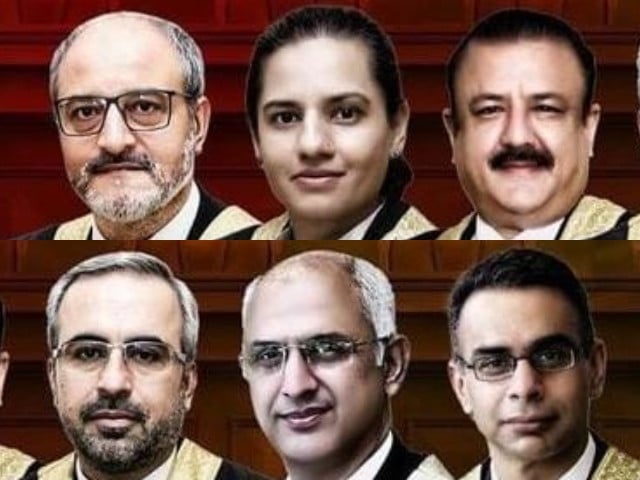On Tuesday, the Lahore High Court Bar Association (LHCBA) and veteran attorney Chaudhry Aitzaz Ahsan filed a motion with the Supreme Court (SC) requesting an inquiry into the claims of espionage agencies interfering with legal proceedings.

In order “to determine the officers and operatives of the ISI or other persons, if any, are or were involved in such unlawful acts and to report its finding to this [Supreme]Court,” Ahsan sought the supreme court to form a committee of three sitting SC judges.
Justices Mohsin Akhtar Kayani, Tariq Mehmood Jahangiri, Babar Sattar, Sardar Ejaz Ishaq Khan, Arbab Muhammad Tahir, and Saman Rafat Imtiaz are among the six judges of the Islamic Heritage Court (IHC) who wrote a letter to the Supreme Judicial Council (SJC) last week voicing their concerns about the “interference” of the intelligence agencies in the court’s operations.
He wanted orders for the federal government to fire people who were involved in “unlawful acts,” saying they would not be eligible for retirement or other benefits from the federal treasury. It said that any retirement or related benefits would end for individuals who had already retired.
Ahsan pleaded with the federal government to pass the laws required to implement the petition’s provisions.
In his petition, he questioned the subject of public interest in the six IHC judges’ letter case by using Article 184(3) of the Constitution.
“Without prejudice to the provisions of Article 199, the Supreme Court shall if it considers that a question of public importance concerning the enforcement of any of the Fundamental Rights conferred by Chapter 1 of Part II is involved, have the power to make an order of the nature mentioned in the said Article,” the petition stated.
Invoking 184(3), the petition said that it was necessary to look into whether judges at various judicial levels—such as high courts and district/special courts—were being swayed by the executive branch or the ISI, as stated in the judges’ letter. It further argued to look into the possibility of an executive-level plot to frighten sitting judges, with help from intelligence services. Finally, it questioned whether laws outlining the authority and responsibility of the ISI actually exist.
Aitzaz begged the federal government to see to it that the prime minister, the chief of army staff (COAS), and the director general of the ISI issued a written directive to all authorities immediately, telling them to ignore any written or verbal orders that attempt to influence judges or tamper with ongoing legal proceedings.
It says, “Alerting them of the consequences of failing to do so.”
Aitzaz has additionally requested in the petition that the aforementioned directions be made available to the public by being posted on the government’s official websites.
LHCBA appeal
In addition, the Lahore High Court Bar Association (LHCBA) filed a petition asking the Supreme Court (SC) to open an investigation into the issues brought forward in the letter written by the six IHC justices.
The bar in Lahore requested, “Direct holding of judicial inquiry by the judges of the Supreme Court of Pakistan into the allegations contained in the letter of six Hon’ble Judges of the Islamabad High Court.”
The bar has petitioned to impose severe sanctions on those found guilty of trying to intimidate, influence, or disrupt the judiciary’s operations in any way.
The motion cited Article 209 of the Constitution, which states that the SJC has “vast and powerful powers to provide judges with protection, to investigate complaints, and to make recommendations for proceedings, including to the Supreme Court of Pakistan concerning the independence of the judiciary.”
“Lack of trust in public institutions engenders autocracy and threatens democracy,” according to the petition.
The petition also stated that “the independence of the judiciary,” a basic constitutional principle, is at stake in the matter raised in the letter from the IHC judges. It states in PLD 2015 SC 415 that this idea has been acknowledged as a pillar of the constitution.
The federal government appointed former Chief Justice of Pakistan Tassaduq Hussain Jillani as the head of an inquiry commission on March 30 to look into claims that the country’s intelligence agencies are interfering with the operations of the Islamabad High Court (IHC). This was done after consulting with Qazi Faez Isa and other senior members of the apex court following the writing of the letter.
But on April 1, just two days later, Jillani resigned from his position as chairman of the inquiry panel charged with looking into claims that intelligence services had interfered with the operations of the Islamabad High Court (IHC).
Suddenly, in reaction to Tassaduq’s recession, the SC noticed a letter authored by the six judges suo motu.










































